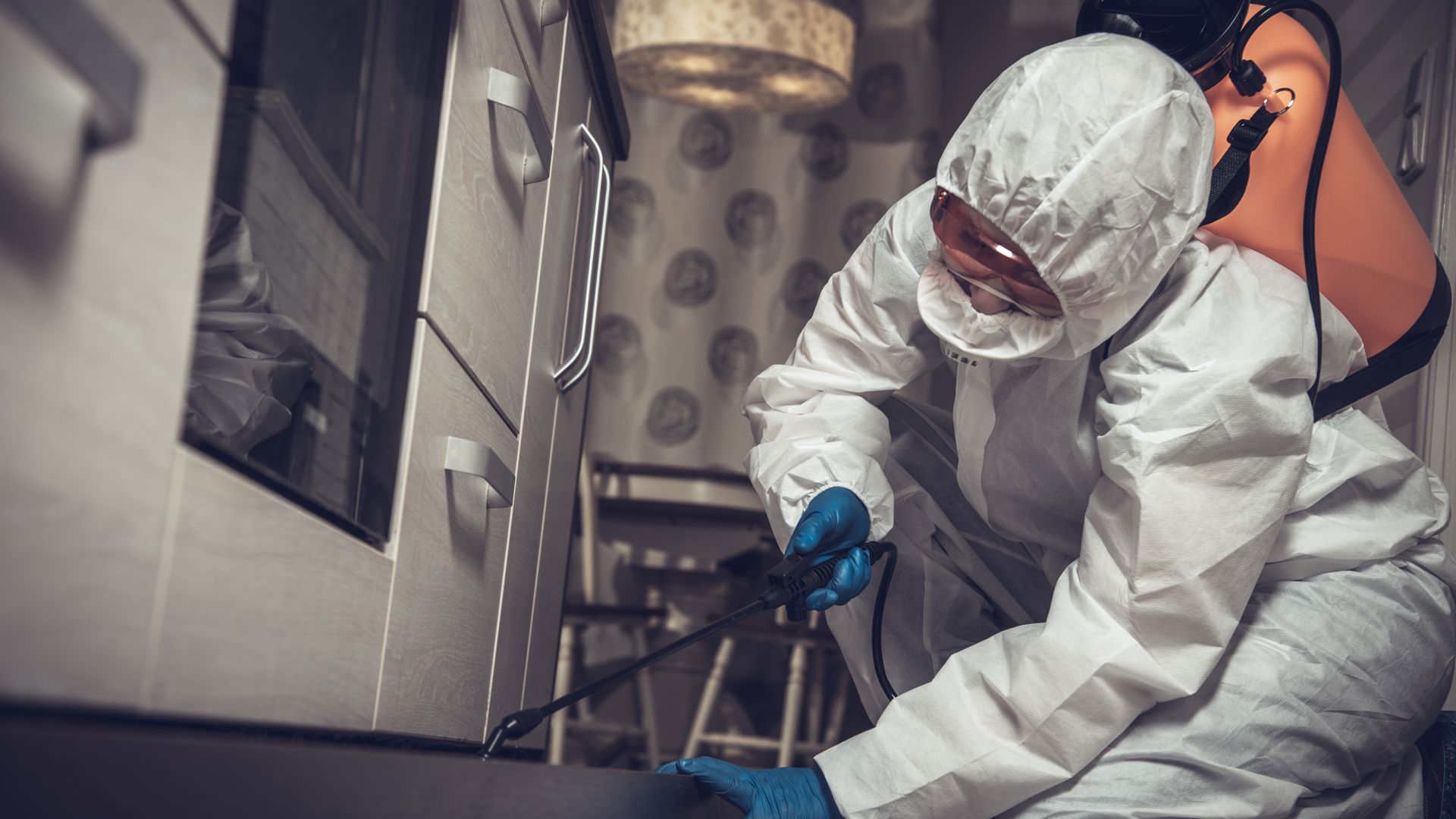
What To Do If You Spot Signs Of Termites On Your Roseville Property
Some pests are capable of spreading disease, bacteria, or just being a nuisance – but only one type of pest can wrack up thousands of dollars in property damage: termites. Since termites can go undetected for years at a time, it’s not a good sign if you’re seeing signs of their presence in your Roseville home.
Here’s what Roseville homeowners should know about the types of termites and damage they cause, why they infest homes, what attracts them, and the benefits of using professional pest control in Roseville.
How To Identify Termites And Their Damage
.2404181026550.jpg)
Because the signs of termites tend to be subtle, it’s important for homeowners to know what to look for, such as:
- Swarmers: Perhaps the biggest sign of a termite problem is spotting termite swarms on your property. During their mating season, termites swarm in large groups when looking for a mate. You may see these flying termites, but it’s more likely that you’ll see the signs left behind from a termite swarm, like their discarded wings.
- Frass: Termite droppings, also called frass, tend to resemble sawdust or coffee grounds since a termite’s diet primarily consists of wood. You may find frass piled close to baseboards, windows, or doors.
- White ants: While termites and ants can look quite similar in size, their coloring varies. If you see light or even white-colored “ants” near your home, they may actually be termites.
- Mud tubes: Subterranean termites create mud tubes near the foundation of your home.
Besides identifying the signs of termites, what do termites look like? Here’s how you can identify termites, and what the most common kinds of termites in Roseville look like:
- Subterranean termites: Subterranean termites are the most common type of termite in the country and in California. These termites prefer to live underground and can have a coloring that ranges from off-white to dark brown. Living underground can also make them harder to spot since the signs are less noticeable. Reproductive subterranean termites are larger, brown or black, and are the only type of termite that has wings. While worker termites are cream-colored or white and resemble small ants, the soldier termites are similar to the workers but with darker heads and more pronounced jaws.
- Drywood termites: Drywood termites don’t need constant access to moisture to survive, and they enjoy making their colonies above-ground in dry wood. These termites are creamy white to light brown and are especially known for their preference for drywall. Their soldier termites have large brown heads with armored jaws.
- Formosan termites: Sometimes called “super termites,” Formosan termites aren’t something you want in your Roseville home. Alates, or reproductive swarmers, only grow to be a little over 1/4 of an inch in length with pale yellow to brownish bodies and translucent wings covered in small hairs. Soldiers have more rounded heads than subterranean termites and lack teeth. Formosan termites are one of the more aggressive types of termites.
Drywood termites tend to be the easiest to catch in your home only because the signs are more obvious. A subterranean or Formosan termite infestation is more likely to go unnoticed for longer periods of time if you’re not getting annual inspections.


Ensuring your home and business are pest-free, explore our different service areas to see if we're local to you! Give us a call to get started!
The Benefits Of Year-Round Professional Termite Control
While there are over-the-counter treatments for termites, these solutions typically aren’t effective long-term. The most effective – and most beneficial way – to deal with a termite problem comes from working with the pros.
At Neighborly Pest Management, our termite control services begin with a thorough inspection of your home, and once we’ve uncovered the root of the infestation and the extent of the damage, we’ll come up with a customized treatment plan to meet the needs of your home.
We’re also available for annual inspections of your home too. As mentioned above, many termite infestations go unnoticed for years at a time. By this point, termites can cause permanent and costly damage to your home. By working with the pros to get an annual inspection, you’ll be able to identify and treat termites before they’ve done too much harm to your home.
Even if there is extensive damage, a technician will be able to help you recognize what’s been damaged – and what’s not.
If you suspect you’ve got termites in your Roseville home, don’t wait – call us today at Neighborly Pest Management to learn more about how we can help.
-
Same-Day & Emergency Services AvailableWhen possible, we can provide prompt assistance to help with your pest solution needs.
-
Local, Family Owned & OperatedRooted in our local communities, we know the best solutions for the pests in our unique areas.
-
We Offer Organic Treatment OptionsEmbrace a eco-friendly approach with our range of sustainable solutions for your needs.
-
45+ Years of Industry ExperienceTrust in our seasoned knowledge and proven track record spanning over four decades.
Factors That Attract Termites To Homes And How To Remove Them
What attracts termites? Although termites can invade your home out of convenience, there are also certain factors that attract them too – and make them much more likely to infest your living space, such as:
- Wooden structures: Given their diet, it shouldn’t come as much surprise that termites are drawn to wood, although preferences can vary based on species. Drywood termites tend to seek out dry woods, while dampwood and subterranean termites prefer rotting or moist wood.
- Moisture: Termites, especially subterranean and dampwood termites, need moisture to survive, so moisture and humidity can be a big attraction. This may include leaky pipes, water-damaged wood, or even humid crawl spaces.
- Soil: Subterranean termites need soil to access the wood, so wood that touches the ground can make it easier for them to infest.
- Firewood: If you’ve got firewood stacked against your home or touching the foundation, you could be attracting termites into your home.
- Dead trees: Rotting wood can draw termites in, so letting dead trees or stumps waste away near your home could do more harm than good.
- Mulch: The wood chips in the mulch can retain moisture, and become a viable food source for termites. If the mulch in your garden is too close to your home, it could also bring termites inside your house too.
- Clogged gutters: Not only can termites be attracted to the debris that’s in your clogged gutters, but since leaving clogged gutters can lead to water damage to your roof, this can provide an easy access point for termites to get inside your home.
As dangerous as termites are, is there anything you can do to prepare for them? Termites can be tricky to deter, but there are a couple of things you can do to make your home less enticing to these pests and prevent termites in your house, such as:
- Try to reduce the moisture and humidity in crawl spaces, basements, and attics by increasing ventilation and using dehumidifiers.
- Avoid storing wood and firewood against the foundation of your home.
- Regularly ensure you’re keeping gutters clear and there’s no moisture build-up near your foundation.
- Keep wooden siding at least six inches or more above the soil.
- Regularly inspect fences or other wooden structures around your property for rotted or infested wood and replace or repair as needed.
- Have a pest control professional perform annual termite inspections in your home to catch termites before they do extensive damage.
While the tips above won’t be able to completely prevent termites, being aware of what attracts them and lowering these risk factors can make all the difference.

Hear From Our Happy Customers
At Neighborly Pest Management, your satisfaction is our priority! See for yourself what our customers have to say about working with us.
-
“We have been using Neighborly Pest for many years. While we have had many competitors come to our door, we have no interest in changing. Doug has been our technician during our entire service, and he is absolutely the best, always friendly!”- Brittany A.
-
“Super friendly and professional. I appreciate the thoughtfulness and professionalism Adam displayed on our initial visit and feel confident he is taking excellent care of my home.”- Erin D.
-
“We can't share enough positive feedback about Doug and Neighborly Pest. Doug has always gone above and beyond to make sure our house stays bug-free!! He's considerate and always follows up to see how things are going after his visit.”- Sabrina C.
-
“We’ve used Neighborly for a couple of years and have had outstanding service consistently throughout. Doug is mindful of our pets and kid's safety as well, making sure that our home is a safe environment for everyone except the pests!”- Greg
-
“Nate is an excellent technician. He is a big reason we’re so happy with the service! Overall a great company and fair pricing.”- M.D.
-
“I've never had a bug problem since I switched to Neighborly. Danny is an awesome technician! He has a great personality and explains things thoroughly and gives me clear and detailed answers to any questions I might have.”- Joe B.





